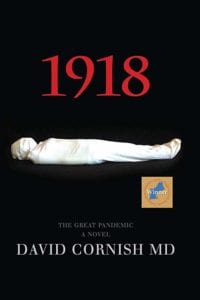
About the Book:
http://www.davidcornishbooks.com
*FIRST PLACE, LITERARY FICTION — Independent Publishers of New England Book Awards (IPNE.org). Written by a doctor of Internal Medicine, “1918” is a rigorously researched and accurate historical novel about the pandemic that killed up to 100 million people. The story is told through the eyes of Dr. Edward Noble, an army major and infectious disease sub-specialist, whose unique position in Boston allows him to detect an emerging influenza strain that is an unprecedented global threat. The actual medical literature and terminology of the time, plus real personal accounts of the pandemic, are used to put the reader in the mind of this early 20th century physician. KIRKUS REVIEWS said, “… (Dr.) Noble is an appealing, knowledgeable focal point in this fictionalized rendering of the great pandemic. …Affecting characters and dramatic storytelling…” BOOKIDEAS.com said, “5 Stars.” “I thoroughly enjoyed this book and highly recommend it to anyone… A great story that weaves the reader between a macro view of one of the most deadly pandemics in history, yet within the chapters there are precious, personal moments that humanize the hero that Dr. Noble unwittingly, yet humbly portrays to the rest of the world. A great read on all levels!” *AWARD WINNER, HISTORICAL FICTION, READERS’ FAVORITE INTERNATIONAL BOOK AWARD – READERSFAVORITE.com said, “5 Stars.” “…1918 is a must read…” The meticulous narrative undeniably has the ability to transport readers back to the era…”
Read an Excerpt:
Featured in Dec/Jan 2016 Issue: 2015 Indie Best Award Winners
“All the men were as they were when you left them, until about 11:00 PM last night. Suddenly, within less than thirty minutes of each other, five of the men displayed a marked rise in their respiratory rates. They began to struggle with breathing, which increased with each passing minute. We applied O2 by masks, but it had no effect. Soon, bloody froth gushed from their nostrils and mouths in huge quantities. Then, Edward, something happened that I have never seen before. It was horrible. The men’s faces first turned cherry-red. But, later their faces gradually turned a cyanotic indigo-blue color that I will never ever forget. It was so deep, so profound…it looked unearthly. The men fought for every breath, struggling to clear themselves of the seemingly endless amount of red fluid that flowed from their respiratory passages. Suddenly, they became very quiet, and showed no further struggle. They breathed as if their bodies knew it was the end. Quietly, one by one, they died. Edward, they all died a horrible hideous death. The staff is very shaken on the quarantine ward. They were all just young men.”
Noble was motionless, and speechless. He had heard a similar clinical description of a few patients six months earlier. That account came from Dr. Loring Minor. Since then, no similar signs and symptoms had been described in the United States. Until now. But, this time it was much worse. After a long pause, Rosenau continued. “Edward, the situation appears to be critical. Four more men are now beginning to show similar signs as the five who died. What is even worse is the fact that ambulances brought us fifty two more patients with influenza from Commonwealth Pier. The Chelsea Naval Hospital is already beyond full capacity.” Noble thought for several moments before he responded to his friend. Finally, he said slowly, “Milton, I will contact army brass to see if some of the sailors can be taken to Devens. We’re preparing an influenza quarantine pavilion at Boston City, and perhaps we can take some of the ill there.
